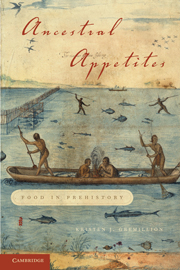8 - Extinctions
Published online by Cambridge University Press: 05 June 2012
Summary
Whether or not fire can be considered as an essential human trait, it has surely been the foremost medium through which mankind has shaped his environment.
Stephen J. Pyne, Fire in AmericaThe industrialized nations of the early twenty-first century are often cast as villains in the drama of global environmental change. Certainly there is much truth in this characterization; however, the simplistic dichotomy between profit-seeking development-at-any-cost and living in harmony with nature is merely a stand-in for a much more complex reality. The distinction between destructive/artificial and harmonious/natural is a useful rhetorical device, but, it emphasizes extremes, whereas most human societies have settled somewhere between them.
Extinctions are only the most extreme example of human modification of the natural environment, but they are familiar to most of us because they are heavily publicized. Extinction is indeed forever (as far as we can say right now, given the status of cloning technology), and we are right to be alarmed at the rapid rate of extinctions that are due to habitat loss, environmental toxins, and other anthropogenic (human-caused) effects. However, modern industrial societies are not unique in having a substantial impact on the habitats in which they live. After all, the people of bands and villages and ancient urban centers had to eat just as we do. They managed the landscape using fire, cleared agricultural fields and gardens, and built huge stone monuments in the rain forest.
- Type
- Chapter
- Information
- Ancestral AppetitesFood in Prehistory, pp. 132 - 145Publisher: Cambridge University PressPrint publication year: 2011



